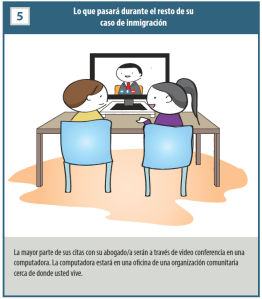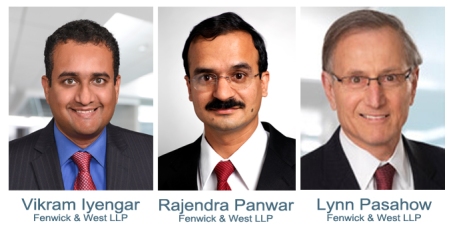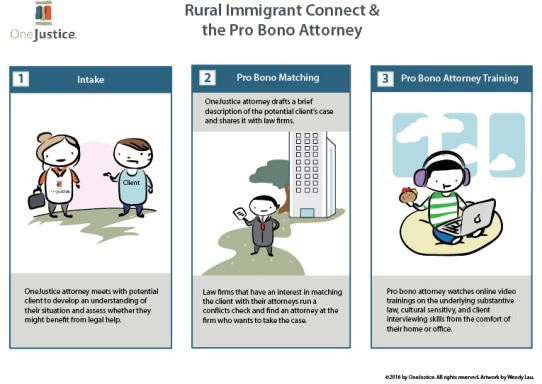Will inspire you, too.
Our very own legal fellow tells us what motivates her to do this work each and every day.
We are excited to announce a new project sponsored by Fenwick & West LLP (and our 2015 Exclusive event sponsor), spearheaded by our very own Renée Schomp, Equal Justice Works AmeriCorps Legal Fellow. We asked Renée to share with all of you this wonderful new project she’ll be tackling next year!
……………………………………………………………………………………………………………………………………………………………………………………………………………………
“Because of this legal clinic, I will continue on and not stop for any reason.”
Guest blog post by Renée Schomp, Equal Justice Works AmeriCorps Legal Fellow
As a social justice attorney, one of my greatest sources of ongoing inspiration is the words of my clients. At a recent immigration clinic one of my clients wrote a note that said, “This clinic has changed my life. It has given me a lot of emotional support to know that I am not alone. Because of this [legal] clinic, I will continue on and not stop for any reason. I will make my dreams come true – for myself and to prove to all the good people that helped me today that it is not a waste of [their] time. Thank you to all the volunteers … from the bottom of my heart.”
To be honest, some days I could really use a bit of inspiration such as these words. This is because the need for legal services is so incredibly overwhelming–particularly among the rural immigrant population with whom I commonly work—and the resources for low-income clients so sparse, that I often find myself fighting what feels like an unwinnable battle.
To give you an idea of what I’m talking about, California has the largest immigrant population in the fifty states (10.3 million) and currently houses over 3 million undocumented immigrants, nearly 700,000 of whom are children and youth under age 24. In November 2014, the Obama Administration sought to improve the lives of over 5 million undocumented immigrants in the U.S. through an expansion of the Deferred Action for Childhood Arrivals (DACA) program and the implementation of the Deferred Action for Parents of Americans and Lawful Permanent Residents (DAPA) program. In California alone, over 1.5 million undocumented immigrants would be eligible for at least temporary relief through these programs. At the moment, however, their implementation has been temporarily halted by a preliminary injunction.
OneJustice develops innovative programs to serve immigrants in rural California
All that said, I have another source of inspiration and that is working for an organization that finds innovative ways to progress when progress seems impossible.

Volunteer attorneys with client at Justice Bus immigration assistance legal clinic in Greenfield, CA
OneJustice’s award-winning Justice Bus Project and Rural Justice Collaborative programs provide as many as eight legal clinics per month in rural and isolated California communities throughout the state–where we serve clients who would likely otherwise receive no assistance at all. Our clinics leverage the talent of teams of attorney and law student volunteers from urban regions such as the Bay Area and Los Angeles to assist rural-based clients with a wide range of civil legal needs, including those related to DACA, citizenship and general immigration.
In September 2015, I will begin a new project focused solely on serving immigrants in three rural counties with a particularly high number of undocumented immigrants and a dearth of legal services–San Joaquin, Stanislaus, and Merced Counties. About 115,000 undocumented immigrants live in these three counties alone, and poverty density is high.
This project is being made possible through the support of an Equal Justice Works fellowship sponsored by the law firm Fenwick & West LLP. The project will build a network of pro bono attorneys to provide full-scope representation to immigrants living in these rural counties. This project will be a part of the continued expansion and growth of the Bay Area Rural Justice Collaborative project, part of the Association of Pro Bono Counsel (APBCo) IMPACT initiative and a collaboration of legal services organizations and law firms that strives to increase access to legal services in isolated communities through free limited scope legal clinics staffed by pro bono attorneys.
This Central Valley immigration project builds upon OneJustice’s already-existing work with Immigration Legal Resource Center (ILRC) on the Immigration Pro Bono Network, which was developed as a means of creating a universally-employed training and certification program regarding DACA for pro bono volunteers. Through this program, we have been collecting and analyzing data from our DACA clinics in order to gauge the efficiency and effectiveness of pro bono volunteers. Beginning in the fall of 2014, the Immigration Pro Bono Network also responded to the expanded DACA and DAPA programs by holding multiple convenings of stakeholders in the legal field interested in developing an effective, wide-reaching pro bono response to these new immigration programs.
This summer, you can help OneJustice help immigrants in rural California

Brother and sister at a Justice Bus immigration assistance legal clinic in South Lake Tahoe, CA
The funds raised at our annual Opening Doors to Justice event on June 25 will be 100% allocated to make the Immigration Pro Bono Network a reality. When we achieve our goal of raising $50,000 in one evening, OneJustice attorneys will be able to provide regional training, support, and coordination to deploy private sector volunteers in the Bay Area and Los Angeles – two of the highest areas of need in the state. In addition, OneJustice will develop a pilot project serving three high need rural counties — Merced, Stanislaus, and San Joaquin — with local clinics and virtual connections to urban volunteers.
Won’t you join us?

P.S. Check out this neat clip of Renée!
![Renée Schomp talking with Univision news reporter about the need for immigration relief. To watch the full video, please visit: [pending link]](https://onejusticeblog.files.wordpress.com/2015/06/img_0035.jpg?w=300&h=300)
Renée Schomp talking with Univision news reporter about the need for immigration relief. To watch the full video, please visit: here
avan117
californiahearings
cmcconkeyonejustice
jennafinkle
Julia R Wilson
Kelsey Williams
kimirishonejustice
Lauren Roberts
Michael Winn
miguelcas3
OneJustice Team
probonotraining
Renée Schomp
stephaniemhernandez



 Renée Schomp is an Equal Justice Works Fellow sponsored by Fenwick & West LLP and Staff Attorney at OneJustice. She currently spearheads the Rural Immigrant Connect project in California’s Central Valley.
Renée Schomp is an Equal Justice Works Fellow sponsored by Fenwick & West LLP and Staff Attorney at OneJustice. She currently spearheads the Rural Immigrant Connect project in California’s Central Valley.


![Renée Schomp talking with Univision news reporter about the need for immigration relief. To watch the full video, please visit: [pending link]](https://onejusticeblog.files.wordpress.com/2015/06/img_0035.jpg?w=300&h=300)




